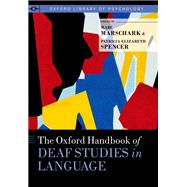Language development, and the challenges it can present for individuals who are deaf or hard-of-hearing, have long been a focus of research, theory, and practice in D/deaf studies and deaf education. Over the past 150 years, but most especially near the end of the 20th and beginning of the 21st century, advances in the acquisition and development of language competencies and skills have been increasing rapidly.
This volume addresses many of those accomplishments as well as remaining challenges and new questions that have arisen from multiple perspectives: theoretical, linguistic, social-emotional, neuro-biological, and socio-cultural. Contributors comprise an international group of prominent scholars and practitioners from a variety of academic and clinical backgrounds. The result is a volume that addresses, in detail, current knowledge, emerging questions, and innovative educational practice in a variety of contexts. The volume takes on topics such as discussion of the transformation of efforts to identify a "best" language approach (the "sign" versus "speech" debate) to a stronger focus on individual strengths, potentials, and choices for selecting and even combining approaches; the effects of language on other areas of development as well as effects from other domains on language itself; and how neurological, socio-cognitive, and linguistic bases of learning are leading to more specialized approaches to instruction that address the challenges that remain for deaf and hard-of-hearing individuals. This volume both complements and extends The Oxford Handbook of Deaf Studies and Deaf Education, Volumes 1 and 2, going further into the unique challenges and demands for deaf or hard-of-hearing individuals than any other text and providing not only compilations of what is known but setting the course for investigating what is still to be learned.








